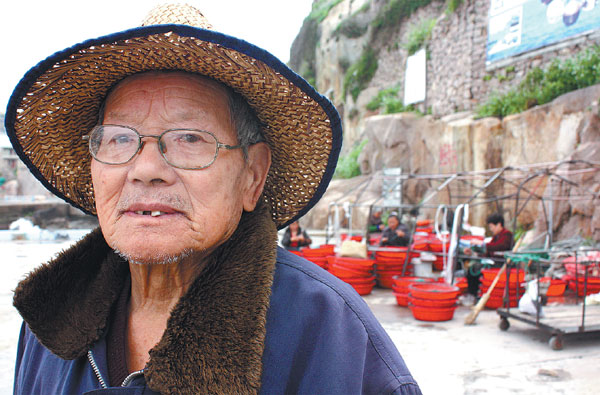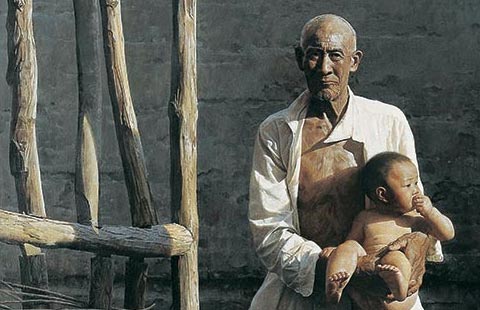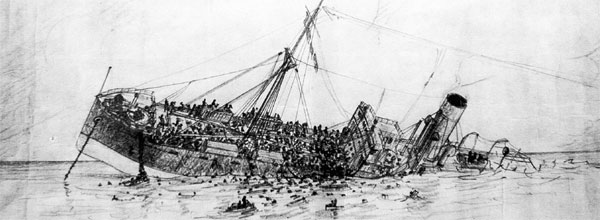Old fisherman recalls heroic act
Updated: 2015-06-10 07:39
By Joseph Catanzaro, Zhou Wa and Liu Xiaoli(China Daily)
|
||||||||
Seven decades after the end of WWII, historians shine a light on Chinese valor during a tragedy at sea, Joseph Catanzaro, Zhou Wa and Liu Xiaoli report.
|
An illustration shows the sinking of the Japanese troopship Lisbon Maru, which was carrying British POWs when it was torpedoed by a US Navy submarine in 1942. Many of the POWs were rescued by Chinese fishermen. Photos Provided to China Daily |
Shen A'gui stared vacantly at the ceiling above his bed, hands fluttering weakly like broken birds on the bunched-up blankets. They are the hands of a fisherman, every scar and callus a footnote for a life spent hauling oars and nets in the stony seas off China's southeastern coast. They are the hands of a man who saved lives when the world was gripped by war and so many others were taking them.
Standing at the bedside, his friend Xu Guoquan, 67, shook his head. "He's 92 years old, and he's sick with a fever," he said. "He hasn't spoken in two weeks."
The fisherman is the only surviving Chinese participant of a daring rescue in 1942 that saw hundreds of British servicemen saved from almost certain death. "I don't know if he remembers," his friend said.
Suddenly, a paper-thin voice emanated from Shen's sickbed. "I was scared," the elderly man whispered. "I was only 19. The Japanese were shooting. Hou'Ao beach ... that is where we rescued the foreigners."
Shen's voice and memory returned. He has not forgotten the day when the war came to his home on the Dongji Islands and a humble group of Chinese fishermen became heroes.
This year, as the world commemorates the 70th anniversary of the end of World War II, China is preparing to mark the conclusion of the War of Resistance against Japanese Aggression (1937-45), a bloody chapter in the global conflict. Western and Chinese historians have only recently begun to shine a light on how China's fight against the Japanese army played a crucial role in the greater Allied victory.
Rana Mitter, director of the University of Oxford's China Centre and author of China's War with Japan 1937-45: The Struggle for Survival, is among those working to broaden the historical narrative.
 |
 |
Forgotten ally
During the Cold War, the Western nations and China forgot the significance of their wartime alliance against Japan, according to Mitter. "Various things China did changed the path of the war," he said. "Most noticeably the decision ... to continue resistance after (Japan invaded China in) 1937, when they could well have surrendered. Over the course of the war, at their height, (China) was holding down 500,000 Japanese on the Chinese mainland."
Those Japanese troops, tied down fighting Chinese soldiers, could not be deployed in Southeast Asia and the Pacific theater, a handicap that may well have changed the outcome of key battles, according to Mitter. China's resistance also prevented Japan from pushing into new fronts that could have had a significant impact on the war in Europe.
A Japanese incursion into British India would have threatened a source of manpower and resources vital to the fight against Nazi Germany. A push into Russia, an ally that proved crucial in Adolf Hitler's eventual defeat, would also have seen the already beleaguered Red Army fighting on two fronts.
Mitter said Japan planned to conquer China in three months. Almost five years after the initial invasion, when Pearl Harbor was bombed, Japan was still "stuck in the Chinese quagmire".
But China paid a heavy price for its refusal to surrender. By the time the guns finally fell silent in 1945, an estimated 15 million Chinese soldiers and civilians had been killed. To put that in context, the fighting in China is estimated to have accounted for 90 percent of all casualties in the Pacific theater. "These were major contributions that don't tend to be remembered very much in the West," Mitter said.
Conversely, China was only able to stay in the fight because of the supplies and support it received from Western allies, in particular Britain and the United States, which were also engaging Japanese troops elsewhere who could have been thrown against China.
"Without the Chinese contribution, it's much harder to see an Allied victory in Asia during the war," he said. "But without the British and Americans, it's also much harder to see a Chinese victory."
Even less well known are the tales of camaraderie between locals and foreigners in China during the war. In the northeastern city of Shenyang, Chinese people endured alongside captured British, US and Australian troops in the concentration camps, often smuggling in what little food they had to the emaciated foreigners. In Guizhou province, in China's southwest, foreign doctors working for the Red Cross helped save the lives of many thousands of Chinese soldiers and civilians. In western, central and southern provinces, British and Australian commandos trained and fought alongside Chinese guerrilla forces. And in other locations, locals such as Shen staged daring rescues to save foreign prisoners of war.
"This is really a story about both sides helping each other, and I hope that's the view that becomes more lodged in the historical consciousness," Mitter said.
They may be the forgotten allies on the forgotten front, but seven decades on, there are those in China who still remember.
- Exhibition displaying anti-Japanese war archives opens to public
- Key IS leader killed in Lebanon
- British PM hails UK-China relations
- Vice-premier promotes food sector ties with Italy
- Myanmar's NLD party leader leaves for her first visit to China
- Vietnam's top party leader expected to visit US next month

 US dollar inspired art to be auctioned at Sotherby
US dollar inspired art to be auctioned at Sotherby
 Coffee shop where Premier Li met entrepreneurs
Coffee shop where Premier Li met entrepreneurs Cavs edge Warriors to take charge of finals
Cavs edge Warriors to take charge of finals
 Work hard, play hard - five ways to shake off exam stress
Work hard, play hard - five ways to shake off exam stress

Six co-investments by Jack Ma and Pony Ma

 Yes, we are waiting for our children
Yes, we are waiting for our children
 Chinese artist to be recognized at International Muse Awards
Chinese artist to be recognized at International Muse Awards
 2015 Apple WWDC kicks off in San Francisco
2015 Apple WWDC kicks off in San Francisco
Most Viewed
Editor's Picks

|

|

|

|

|

|
Today's Top News
G7 'ignores facts over South China Sea'
Obama weighs sending several hundred more US troops to Iraq
MSCI delays including China A shares in benchmark index
7 Chinese gay couples hold wedding ceremony in West Hollywood
New window on China
Prove hacking: experts
Amid tensions, top Chinese brass visiting US
Apple reveals plan to develop all-platform eco-system empire
US Weekly

|

|








